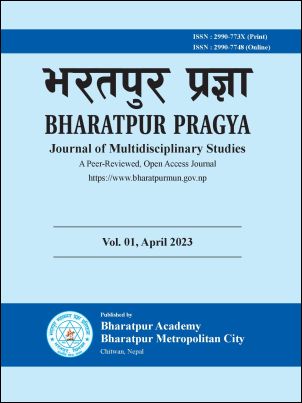Copula Construction in Kathariya Tharu
DOI:
https://doi.org/10.3126/bpjms.v1i1.55498Keywords:
Non-verbal predicate, nominal predicate, predictive adjective, predictive locative, predictive possessionAbstract
Kathariya Tharu is one of the least studied Indo-Aryan languages spoken by the Kathariya Tharu community living in Kailali district of Nepal and Gorakhpur, Gonda, Lakhimpur, and Khiri districts of India. This is a preliminary study which analyses the morphosyntactic structure of copula construction in this language. The linguistic data for this study were collected from Ghodaghodi municipality, ward no. 9, Sisaiya, ward no.12, Kota and Kailari rural municipality, ward no. 8, Lausa and were analyzed with the help of the Toolbox software. R. M. W. Dixon’s Basic Linguistic Theory has been employed as analytical tool, though insights have also been taken from other linguists. Kathariya Tharu employs the verbal copula construction strategy with three copula verbs- ho, ba, and rəh. Unlike other NIA languages in which the relation between the copula subject and copula complement is prominent, in Kathariya Tharu, it is the copula subject that determines the selection of the copula verb. However, the person, relation and function distinctions between the copula subject and copula complement disappears in the past tense and so, the same copula rəh is used with all the subjects.
Downloads
Downloads
Published
How to Cite
Issue
Section
License
Copyright (c) 2023 Krishna Prasad Paudel, Kamal Krishna Khanal

This work is licensed under a Creative Commons Attribution-NonCommercial 4.0 International License.
CC BY-NC This license allows reusers to distribute, remix, adapt, and build upon the material in any medium or format for noncommercial purposes only, and only so long as attribution is given to the creator.




